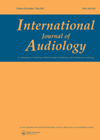
Journal Reviews
Cochlear implantation in immunosuppressed patients. Is it feasible?
The effectiveness of cochlear implantation has led to a relaxation of the candidate criteria. Patients who had been rejected in the past may now be accepted and their outcomes are encouraging. However, the acceptance of immunosuppressed patients as cochlear implant...
How do the rejected candidates for cochlear implantation feel?
This interesting study from the UK explored, using personal interviews, how rejected candidates for cochlear implantation feel and deal with the decision not to implant. The authors assessed 10 adult cochlear implant candidates who had undergone the evaluation process were...
Does head trauma as aetiology of deafness affect the outcomes of cochlear implantation?
Head trauma associated with temporal bone fractures is a well known aetiological factor for deafness. The literature assessing the outcomes of cochlear implantation in such cases is rather limited. In this paper, the authors compared the performance of implantees with...
Hearing protection and hearing loss
This study examined the interaction of hearing protection for noise reduction and hearing loss with speech recognition performance. Forty five subjects with four hearing loss profiles were fitted with two different level dependent hearing protectors (circumaural and inserts) in two...
Hearing protectors and speech perception
This study tested 31 subjects using hearing protectors by maintaining a constant intensity level for the speech signal while varying background noise levels. The goal was to use this test to detect speech perceptual abilities under different hearing protectors –...
Bone anchored hearing devices in very young children
This paper presents results of BC devices in very young children and helps inform an honest discussion of risks / benefit with prospective parents. The authors of this article from Starship Children’s Hospital, Auckland, New Zealand have a series of...
Leptin has no role in idiopathic sudden sensorineural hearing loss
This paper from Turkey claims to be the first study dealing with the relationship between leptin and idiopathic sudden sensorineural hearing loss (ISSHL). I remember leptin being a fashionable topic in obesity research, when leptin deficiency was thought to be...
Experience of the Sophono transcutaneous bone conduction system
This article is a frank discussion of the authors’ experience implanting these devices. The principle of the device is surgical implantation of a bilobed magnet within a bony well in the cranium (similar position to BAHA). The implant is a...
Hearing aid standards and test systems
Hearing aids are the most used management / rehabilitation option for people with hearing loss. Generally, hearing instrument manufacturers perform the hearing aid performance measurements and provide its specification in terms of functionality. However, it is also common for government...
Hearing loss in the young and self-esteem
How can those involved in the care of children with hearing loss identify those at risk of low self-esteem? This study provides some guidance. Overall differences from hearing peers in terms of communication skills, physical appearance and social maturity place...
The effect of sleep deprivation on auditory processing
This article caught my eye for personal and professional reasons. As a full time ENT trainee working 24-hour on-calls, I also have young children who have never slept through the night and don’t respect weekends or days off. My FRCS...
Review: Cochlear Implantation in SSD?
Contra lateral routing of signals (CROS) using hearing aids and bone conduction devices has been the conventionally accepted modality for the treatment of single sided hearing impairment. The CROS hearing aid has been found to improve speech understanding in noise,...















